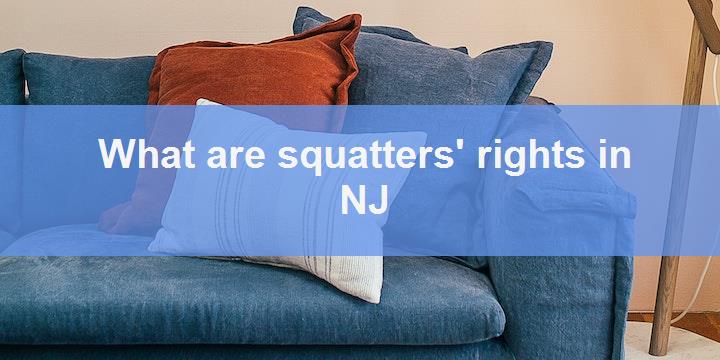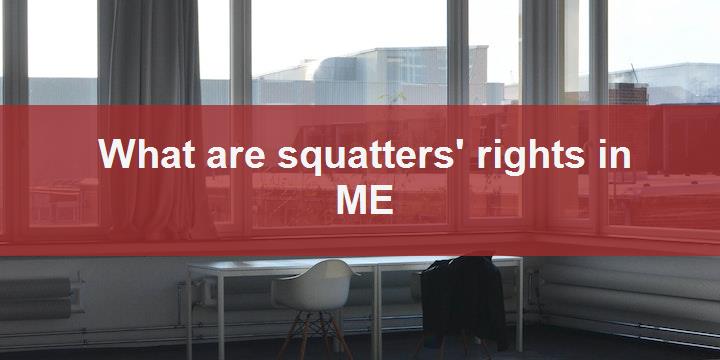What are squatters’ rights in New Jersey?
Firstly, it is important to understand what squatters’ rights are in New Jersey. Essentially, squatters are individuals who occupy a piece of property without the owner’s permission. However, over time, they may acquire certain rights to stay on the property. In order for squatters to establish these rights, they must meet certain requirements, such as occupying the property for a specific amount of time.
Additionally, it is important to note that there are limitations to squatters’ rights in New Jersey, particularly in cases where the owner is actively attempting to reclaim the property. Ultimately, anyone involved in a situation with squatters should seek legal advice to fully understand their rights and options.
What is the squatting/squatter?
The concept of squatting has been a controversial topic for decades. Squatting refers to occupying an abandoned or unused property without the owner’s permission. Squatters usually live in these properties while adapting them to their needs without paying any rent. Squatting is often associated with homelessness, poverty, and environmentalism movements.
Despite its negative connotations, there are instances where squatting has been used as a protest against social inequality and gentrification. For example, in England, squatters occupied a building in central London and turned it into a public housing project for homeless people.
What is Adverse posession in New Jersey?
Adverse possession in New Jersey refers to the legal concept whereby a person who has continuously and openly occupied a piece of land for a certain period can claim ownership of the property. Essentially, adverse possession allows someone who has been using a property without the owner’s permission to eventually become the rightful owner of that property. This process can be complex, and it is important to understand the legal requirements involved.
Specifically, certain conditions must be met for a person to be eligible to claim adverse possession. For example, the continuous use of the property must be open and obvious, and the claimant must show that they have used the land without the owner’s consent for a minimum of 30 years. Overall, understanding the concept of adverse possession is crucial for anyone who owns or is looking to purchase real estate in New Jersey.
Is it legal to squat in New Jersey?
Firstly, it’s important to note that squatting in New Jersey is a complicated issue with no clear-cut answer. According to New Jersey law, if someone occupies a property without permission from the owner, it can be considered trespassing. However, there are certain circumstances where squatters may have legal protections, such as if they have lived in the property for a certain amount of time or have made improvements to it. Additionally, eviction laws in New Jersey can be complex and may require a court order. Ultimately, it’s best to seek legal advice if you are considering squatting in New Jersey or are facing eviction as a squatter.
Can police remove squatters in New Jersey?
Firstly, it’s important to note that squatters in New Jersey have legal rights that must be respected. However, if a property owner wants to remove them, there are steps they can take. The first step is to issue an eviction notice, which gives the squatters a certain amount of time to vacate the premises. If they refuse to leave, the police may get involved.
It’s worth noting that this can be a complicated and time-consuming process, so seeking legal advice is recommended. Ultimately, the police can remove squatters in New Jersey, but it must be done following the correct legal procedures.
How to evict squatter in New Jersey?
To start with, it is important to understand your legal rights before taking any action against a squatter. Additionally, documenting the situation and gathering evidence might be helpful in court. Moreover, serving a proper eviction notice to the squatter is necessary, as failure to do so might have legal repercussions later on.
Once the notice is served, it is important to follow the legal proceedings carefully, which may involve attending court hearings and presenting evidence to support your case. It is important to note that forcibly removing a squatter without proper legal procedures can lead to legal troubles, so it is always best to stick to the proper legal framework.
FAQ
Q: What are squatters’ rights?
A: Squatters’ rights are legal protections that allow someone who has been living in a property for a certain amount of time, without the owner’s permission, to claim ownership of the property.
Q: Is squatting legal in New Jersey?
A: No, squatting is not legal in New Jersey. However, there are certain circumstances in which squatters may be able to claim ownership of a property (see next question).
Q: Under what circumstances can squatters claim ownership of a property in New Jersey?
A: Squatters in New Jersey can claim ownership of a property if they have lived there continuously for 30 years, paid property taxes for at least 20 years, and made significant improvements to the property without the owner’s objection. This is known as adverse possession.
Q: Can a property owner evict squatters in New Jersey?
A: Yes, property owners in New Jersey can evict squatters through the legal eviction process. This generally involves getting a court order and having law enforcement remove the squatters from the property.
Q: What should property owners do to prevent squatters from taking over their property?
A: There are several things property owners can do to prevent squatters, such as securing the property (e.g. locking doors and windows), posting no trespassing signs, and regularly checking on the property. Property owners can also take legal action if they discover someone is squatting on their property.
Q: Are there any exceptions to the 30-year rule for adverse possession in New Jersey?
A: Yes, there are some exceptions to the 30-year rule. For example, if the property owner is a government entity or nonprofit organization, the time requirement may be shorter. Additionally, if the squatter has a written agreement with the previous property owner, the clock may start over from the date of the agreement.
Also Reading
Best time to buy real estate in North Dakota
Neighborhoods in Austin for families
San Antonio pros and cons of living




